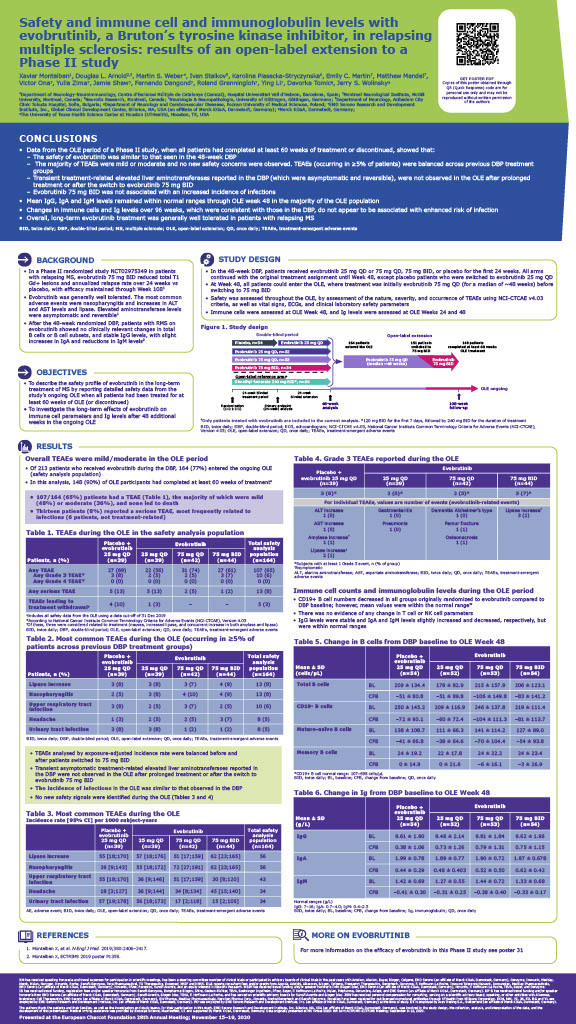Safety and immune cell and immunoglobulin levels with evobrutinib, a Bruton’s tyrosine kinase inhibitor, in relapsing multiple sclerosis: results of an open-label extension to a Phase II study
Abstract
Background:
In 48-week Phase II study NCT02975349, in patients with relapsing multiple sclerosis, evobrutinib was generally well-tolerated, with no clinically-relevant changes in immune cell parameters or immunoglobulin (Ig) levels. We report long-term safety data from the ongoing open-label extension (OLE) in patients treated ≥60 OLE weeks.
Methods:
During the double-blind period (DBP), 213 patients were randomized to evobrutinib 25mg once-daily (QD), 75mg QD, 75mg BID or placebo for 24 weeks, continuing until 48 weeks, except for placebo patients who switched to evobrutinib 25mg QD. At Week 48, patients could enter the OLE. Initial treatment was evobrutinib 75mg QD (median ≈48 weeks) before switching to 75mg BID. Treatment-emergent adverse events (TEAEs) were assessed throughout the OLE, immune cells at OLE Week 48, and Ig levels at OLE Weeks 24 and 48.
Results:
TEAEs occurred in 107 (65.2%) of OLE patients (47.6% mild, 36.0% moderate), balanced across previous DBP groups; no deaths occurred. Transient aminotransferase elevations seen in the DBP were not observed in OLE patients continuing evobrutinib. CD19+ B cell counts decreased versus DBP baseline in all DBP evobrutinib groups, although mean values stayed in normal range, with no changes in memory B cell, T cell or NK cell counts, and no relevant change in IgG levels versus DBP baseline. Mean IgA and IgM levels increased and decreased, respectively, versus DBP baseline, but within normal ranges. These immune cell and immunoglobulin changes following long-term treatment with evobrutinib did not appear associated with enhanced infection risk, with incidence in the OLE similar to that in the DBP.
Conclusions:
Safety of evobrutinib over ≥60 weeks of the OLE was similar to that in the DBP. Treatment was well-tolerated; no new safety signals were observed. OLE 48-week immune cell and Ig levels were consistent with the DBP. Evobrutinib 75mg BID was not associated with increased infection risk.
Safety and immune cell and immunoglobulin levels with evobrutinib, a Bruton’s tyrosine kinase inhibitor, in relapsing multiple sclerosis: results of an open-label extension to a Phase II study
Previous publication of these data: These data were presented for the first time at MS Virtual 2020: 8th Joint ACTRIMS/ECTRIMS Meeting, September 9–12, 2020.

